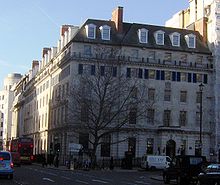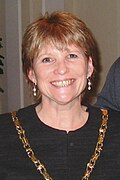Royal College of Nursing
This article needs additional citations for verification. (April 2016) |
Royal College of Nursing | |
 | |
| Founded | 1916 |
|---|---|
Members | 432,000+ (2015) |
| Website | www |
The Royal College of Nursing (RCN) is a membership organisation and trade union with over 432,000 members in the United Kingdom. It was founded in 1916, receiving its royal charter in 1928. Her Majesty Queen Elizabeth II is the patron. The majority of members are registered nurses; however student nurses and healthcare assistants are also members.
The RCN describes its mission as representing nurses and nursing, promoting excellence in practice and shaping health policies. It has a network of stewards, safety representatives and union learning representatives as well as advice services for members. Services include a main library in London and regional libraries around the country. The RCN Institute also provides courses for nurses.
History
In 1916 the College of Nursing Ltd was founded with 34 members as a professional organisation for trained nurses[2] on a proposal from Arthur Stanley. Part of the objective was to set up a register of nurses. It was very explicitly not to be a Trade Union. It attempted an amalgamation with the Royal British Nurses' Association, but this was frustrated, largely by the efforts of Ethel Gordon Fenwick. In March 1917 the College had 2,553 members and by 1919 13,047, a great deal more than the RBNA. It had most of the nursing places on the General Nursing Council when it was first established, and by 1925 it had about 24,000 members. Membership was restricted to registered general nurses, thus excluding male nurses [3]
A Royal Charter was granted in 1928 and the organisation became the College of Nursing.[4] It pushed for registered nurses to be given precedence, and to be in charge. In 1935 the Trades Union Congress promoted a Bill to secure a 48-hour working week for all hospital employees. The college opposed this and was accused by the TUC of being "an organisation of voluntary snobs".[5] In 1939 the college's name was changed to the Royal College of Nursing. The Ministry of Health guaranteed a salary of £40 to nursing students in training in 1941, about double what voluntary hospitals were paying before the war. The Royal College said that this was too high.[6]
Since 1977 the RCN has been registered as a trade union.[7]
In 2018, after a pay agreement that was not clearly explained to the membership was agreed, a motion of no confidence in the RCN Council was passed in September 2018 with 78% of members votes. The Chief Executive and General Secretary, and the Director of Member Relations, had previously resigned.[8][9]
Offices


Headquarters
The headquarters are at 20 Cavendish Square, London, a Grade II listed building[10] which was built as a substantial town house in 1729 and became the residence of British Prime Minister H. H. Asquith. The building was refronted and incorporated by architect Edwin Cooper in 1930 into his redevelopment of the corner site with Henrietta Place.[citation needed]
Regional Offices
The RCN has offices throughout the UK. In England regional offices are located in Birmingham, Bolton, Bury St Edmunds, Croydon, Exeter, Newbury, Nottingham, Leeds, and Sunderland. The Northern Ireland office is in Belfast. The Scottish offices are located in Aberdeen, Edinburgh and Glasgow; and the Welsh offices are located in Cardiff and Conwy.[citation needed]
Council
The RCN is governed by its Council. Council members are guardians/trustees of the organisation's mission and values on behalf of the members. They are also charity trustees and carry legal duties and responsibilities laid down by charity law. The Council is responsible for the overall governance of the RCN, and has ultimate responsibility for the sustainability and the finances of the organisation.[citation needed]
The Council is made up of 31 Council members: two elected by each of the 12 geographical sections (Scotland, Wales, Northern Ireland and 9 English), two elected by student members (RCN Students), two elected by HCA members (RCN HCA), the RCN President and Deputy President, elected by all members, and the Chair of RCN Congress (non-voting), who is elected by Congress voting entities.[citation needed] The RCN's General Secretary is appointed by Council. Council members are not paid to serve on Council but voluntarily give up their time to serve the RCN and its members, in their governance role. The current[when?]
Presidents

- 1922–1925 Dame Sidney Browne GBE RRC
- 1925–1927 Dame Sarah Swift GBE RRC
- 1927–1929 Annie Warren Gill RRC
- 1929–1930 Rachael Cox-Davies CBE RRC
- 1930–1933 Margaret Sparshott CBE RRC
- 1933–1934 Edith MacGregor Rome RRC
- 1934–1935 Rachael Cox-Davies CBE RRC
- 1935–1937 Dorothy S. Coode OBE
- 1937–1938 Edith MacGregor Rome RRC
- 1938–1940 Beatrice Marsh Monk CBE RRC
- 1940–1942 Mary Jones OBE ARRC
- 1942–1944 Emily E. P. MacManus OBE
- 1944–1946 Mildred F. Hughes
- 1946–1948 Gladys V. L. Hillyers OBE
- 1948–1950 Dame Louisa Wilkinson DBE RRC
- 1950–1952 Lucy Duff-Grant RRC
- 1952–1954 Lucy J. Ottley
- 1954–1956 Sybil C. Bovill
- 1956–1958 Gertrude M.Godden OBE
- 1958–1960 Marjorie J. Marriott OBE
- 1960–1962 Margaret J. Smith CBE
- 1962–1963 Marjorie J. Marriott OBE
- 1963–1964 Mabel Gordon Lawson OBE
- 1964–1966 Florence Udell CBE
- 1966–1968 Theodora Turner OBE ARRC
- 1968–1972 Mary Blakeley OBE
- 1972–1976 Dame Winifred Prentice DBE
- 1976–1980 Eirlys M Rees CBE
- 1981–1982 Marian K. Morgan
- 1982–1987 Dame Sheila Quinn DBE FRCN
- 1988–1990 Maude Storey CBE FRCN
- 1990–1994 Professor Dame June Clark DBE FRCN
- 1994–1998 Professor Dame Betty Kershaw DBE FRCN
- 1999–2000 Christine Watson
- 2000–2002 Roswyn Hakesley-Brown
- 2002–2006 Sylvia Denton OBE FRCN
- 2006–2010 Maura Buchanan
- 2010–2014 Andrea Spyropoulos
- 2015–present Cecilia Anim
General Secretaries
- 1916-1935 Mary Snell Rundle RRC
- 1935-1957 Frances G. Goodall OBE
- 1957-1982 Dame Catherine M. Hall DBE FRCN
- 1982-1989 Trevor Clay CBE FRCN
- 1989-2001 Christine Hancock
- 2001-2007 Beverly Malone
- 2007-2015 Peter Carter OBE FRCGP
- 2015-2018 Janet Davies
Members
The RCN is a membership organisation and a trade union with over 435,000 members. Nursing students may join at reduced fees. Following the announcement of the removal of NHS Student bursaries in November 2015 the RCN initiated its support[clarification needed] through the campaign "Nursing counts".[11]
Events
RCN holds events nationwide throughout the year, including branch events, educational events and the annual Congress and AGM. The annual congress aims to help members to meet to learn, develop and share nursing practice; members help to inform the RCN agenda and influence nursing and health policy through debate. In 2016 Congress will be in Glasgow.[12]
RCN libraries
The RCN Library claims to be Europe's largest nursing-specific collection.[13] The RCN has four libraries throughout the United Kingdom: one in Northern Ireland (a region) and one in each constituent country of the United Kingdom. The libraries are located in Belfast, Cardiff, Edinburgh and London.
The London Library, which is now known as the UK Library, was founded in 1921, and its contents include 60,000 volumes, 500 videos and 400 current periodicals on nursing and related subjects. The catalogue, with information on over 600m records, is now online.[14] Due to its historical holdings, the Library is a member of The London Museums of Health & Medicine group.[15] Special collections include the Historical Collection and the RCN Steinberg Collection of Nursing Research, the latter of which comprises over 1,000 nursing theses and dissertations. Set up in 1974, the RCN Steinberg Collection of Nursing Research contains a selection of influential nursing theses and dissertations from the early 1950s to the present day.[16]
Fellowships
The RCN awards Fellowships for exceptional contributions to nursing. Honorary Fellowships can also be granted by RCN Council to those who are unable to become an RCN member, either because they are from overseas or because they work outside the nursing profession. Fellows and Honorary Fellows are entitled to the postnominal FRCN.[17]
RCN Publications
RCN Publishing (branded as RCNi since March 2015) produces RCN Bulletin, a monthly member publication, and Nursing Standard, which is available through subscription and on news stands. It also publishes a range of journals for specialist nurses: Cancer Nursing Practice, Emergency Nurse, Learning Disability Practice, Mental Health Practice, Nursing Children and Young People, Nursing Management, Nursing Older People, Nurse Researcher, and Primary Health Care.
RCN Awards
Formerly the Nursing Standard Nurse Awards, the annual RCNi Nurse Awards celebrate nursing in different categories. The Awards take place in England, Scotland, Wales and Northern Ireland. There is a category for Nursing Students.[18]
RCN Wales Nurse of the Year Awards recognises nurses for their outstanding achievements in raising the standards of nursing practice, improving patient care and showcasing the nursing contribution to healthcare in Wales. The awards are given annually with 17 award categories and an overall winner who receives the accolade of the RCN Wales Nurse of the Year. All qualified nurses and midwives registered to practice in Wales, pre-registration nursing students and health care support workers are eligible for nomination in the relevant categories.[19]
Campaigns
As of February 2016 the RCN is currently running the 'Nursing Counts' campaign.[20] The Nursing Counts campaign is a broad campaign encompassing fair pay and conditions and the removal of the NHS student bursary which will be removed from 2017.
Previous campaigns have been – What if?[21] & 'Nursing the Future' 2004[22]
RCN Foundation
On 1 April 2010 the RCN announced the launch of the RCN Foundation – an independent charity to support nursing and improve the health and wellbeing of the public. The new foundation will undertake a number of activities including giving grants for improving nursing practice through activities that, for example, support the development of clinical practice and improve the quality and standard of patient care and experience.
References
- ^ "Royal College of Nursing Head Office".
- ^ "About us: our history". RCN. Retrieved 27 July 2014.
- ^ Abel-Smith, Brian (1960). A History of the Nursing Profession. London: Heinemann. p. 92.
{{cite book}}:|access-date=requires|url=(help) - ^ "About us: our constitutional documents". RCN. Retrieved 27 July 2014.
- ^ Abel-Smith, Brian (1960). A History of the Nursing Profession. London: Heinemann. p. 143.
{{cite book}}:|access-date=requires|url=(help) - ^ Abel-Smith, Brian (1960). A History of the Nursing Profession. London: Heinemann. p. 165.
{{cite book}}:|access-date=requires|url=(help) - ^ "About us: our structure". RCN. Retrieved 27 July 2014.
- ^ Mitchell, Gemma (28 September 2018). "RCN pay deal review finds lead negotiator role had 'conflict of interest'". Nursing Times. Retrieved 29 September 2018.
- ^ "Breaking: RCN council lose 'no confidence' vote over NHS pay deal". Health Service Journal. 28 September 2018. Retrieved 29 September 2018.
- ^ "20 Cavendish Square". Images of England. Retrieved 30 June 2006.
- ^ "Nursing Counts". The Royal College of Nursing. Retrieved 9 February 2016.
- ^ "About the RCN". rcn.org.uk. 31 July 2015. Retrieved 8 February 2016.
- ^ "RCN Library". rcn.org.uk. RCN. Retrieved 7 April 2016.
- ^ "About the catalogue". archives.rcn.org.uk. Royal College of Nursing. Retrieved 26 August 2016.
- ^ "Medical Museums". medicalmuseums.org. Retrieved 26 August 2016.
- ^ "Permanent Collections". Royal College of Nursing. Royal College of Nursing. Retrieved 26 August 2016.
- ^ "RCN Fellowship and Honorary Fellowship Roll of Honour". Royal College of Nursing. 2016. Retrieved 3 November 2016.
- ^ Hoddinott, John (14 April 2015). "Nursing Student Award". rcn.org.uk. Retrieved 9 February 2016.
- ^ "Wales | Royal College of Nursing". The Royal College of Nursing. Retrieved 15 January 2018.
- ^ "Nursing Counts". Royal College of Nursing. Retrieved 8 February 2016.
- ^ "What If". whatif.rcn.org.uk. Archived from the original on 12 March 2016. Retrieved 8 February 2016.
{{cite web}}: Unknown parameter|deadurl=ignored (|url-status=suggested) (help) - ^ "Campaigns> Re-branding Nursing (RCNi)". journals.rcni.com. Retrieved 8 February 2016.
Further reading
- Bowman, Gerald (1967). The Lamp and the Book: The Story of the RCN 1916–1966. London: Queen Anne Press.
- National Network of Learning Disability Nursing
External links
